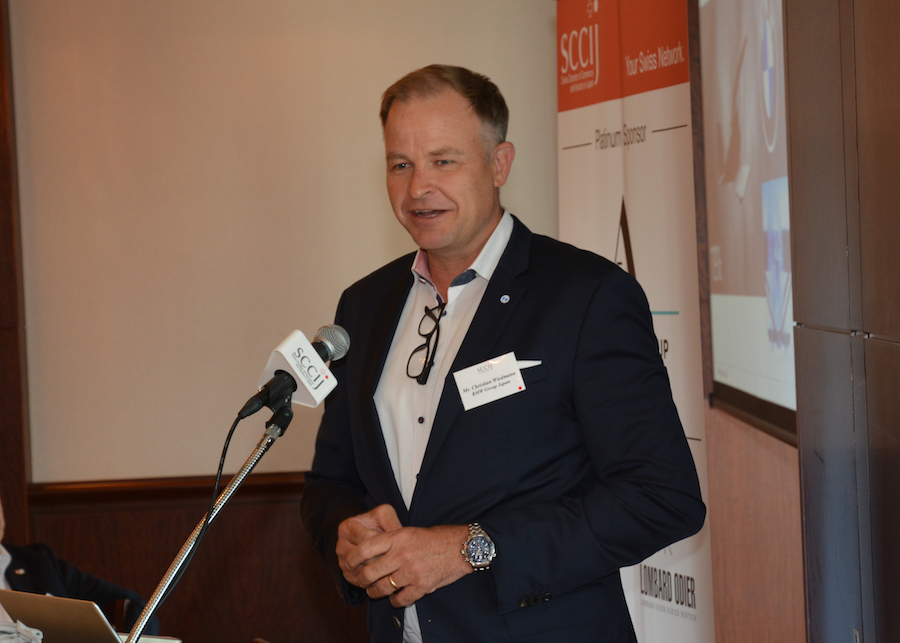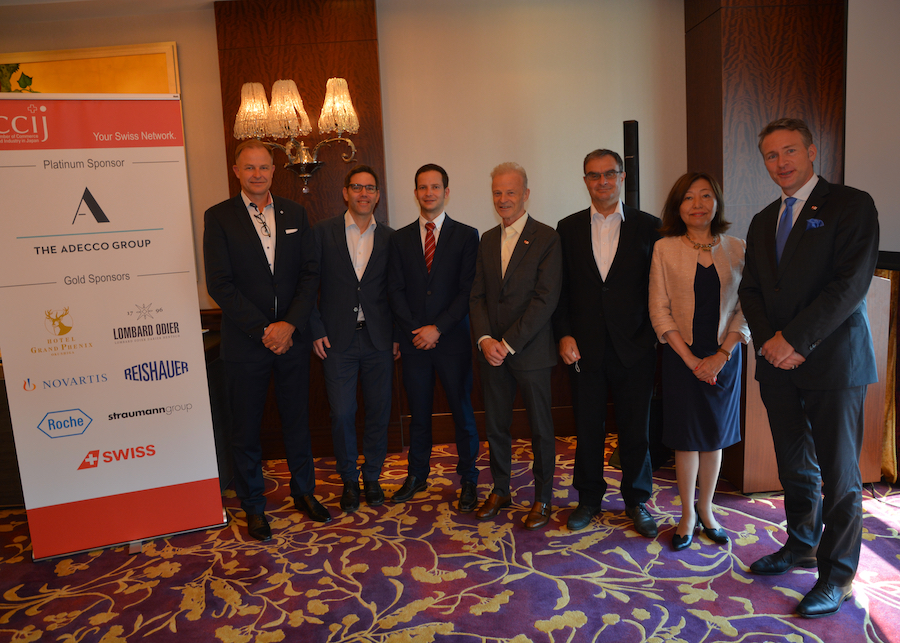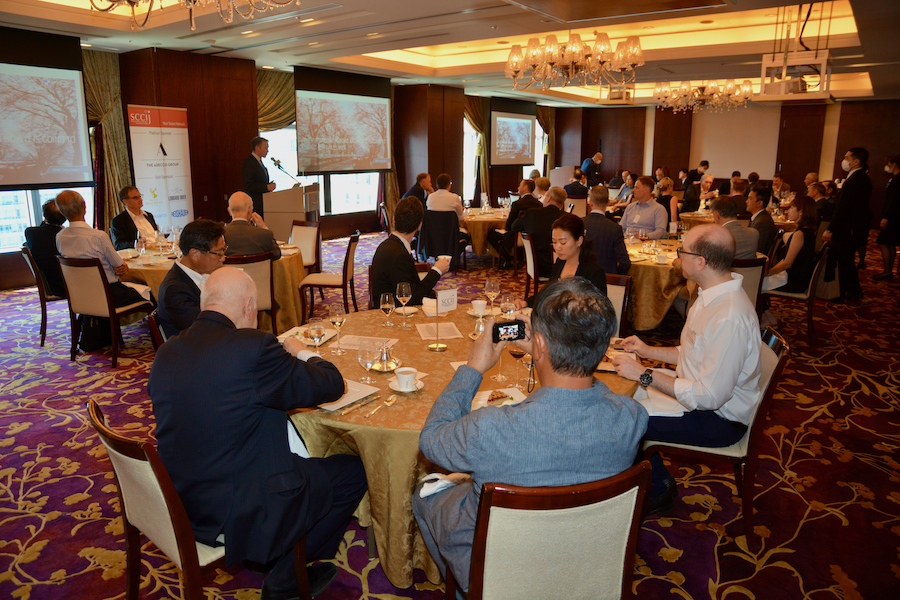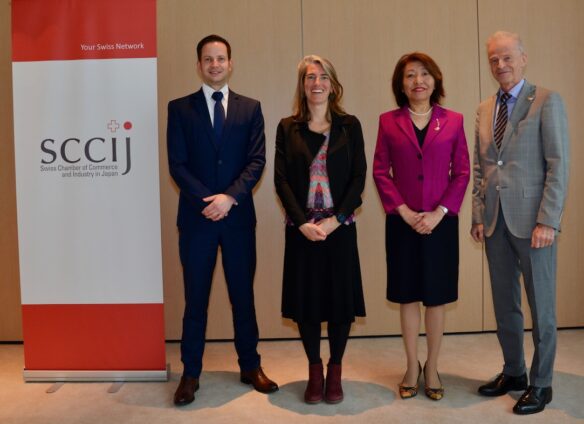Tokyo (SCCIJ) – Mr. Christian Wiedmann, President & CEO of BMW Group Japan, briefed about 50 members and guests of the SCCIJ on the electrification of the car industry at the June Luncheon. He also discussed the challenges and opportunities for car buyers. We present his talk in interview form.

June Luncheon speaker Christian Wiedmann is President & CEO of BMW Group Japan.
Mr. Wiedmann, how far has BMW proceeded in the transition to electrified engines?
Christian Wiedmann: BMW was an early starter with the BMW i3 in 2013. Eight years later, in 2021, we sold 328,000 plugin-hybrids (PHEV) and battery electric vehicles (BEV). By the end of this year, the BMW brand will have 12 BEV models in the market. We aim to deliver 2 million BEVs by 2025 and to achieve 50% of all sales in worldwide will be BEV’s in 2030.
Has BMW set a target year to give up the combustion engine?
C. Wiedmann: BEV is our center of strategy; however, we also continue to develop other drivetrains as well. Main reason is that the infrastructure will develop at a different speed around the world. As a result, we will continue with the combustion engine as long as there is a sizable market. But MINI will go fully electric in early 2030’s.
How would you describe the Japanese market for electric vehicles?
C. Wiedmann: Starting from 2021, all the premium brands are launching BEV models in Japan. Tesla is the market leader, we are at the top of the SUV segment. We are currently launching the BMW i7 as the first fully electric luxury top-end vehicle in closed rooms for selected customers and are already sold out until spring next year. This sector is highly attractive but challenging because the heavier a BEV, the more difficult it is technically.
How much are customers in Japan interested in electrification?
C. Wiedmann: Our survey revealed two points: Customers are open to the new technology and their biggest concern is the range. The phobia subsides if the range is above 460-480 kilometers. Then they will be interested to buy a BEV. Currently, they are more interested in hybrid-engine vehicles (HEV), though. Only 1% of all cars are electrified, and the government expects this share to rise to 13% by 2030.

Members and advisors of the SCCIJ Executive Committee and luncheon speaker Mr. Christoph Wiedmann of BMW Group Japan.
What is needed to change the reserved attitude towards electrification?
C. Wiedmann: There are high subsidies for purchases of BEVs on the national and the Tokyo Metropolitan Government level. But the charging infrastructure is the main issue. Today in Japan, we have 13,000 slow AC chargers and 7,000 fast DC chargers with only a 40-50-kilowatt capacity, one-third of the European standard. Fortunately, the Japanese government has committed itself to 30,000 fast DC chargers and 120,000 slow AC chargers in 2030.
How convenient is using an electric car today in Japan?
C. Wiedmann: The average Japanese owner uses the car only for 20 kilometers per day. With a battery range of 500 kilometers, you do not have to charge often. An AC charger in your house will need 22 hours with 3KW charging to load the battery. BMW gives you a wall box free which allows you to fully charge your car overnight in 11 hours with 6 KW. Please note that mentioned figures are up to 80% of charging. Financially, our monthly installments for BEVs are on the same level as combustion engine vehicles. A full charge costs about 3,000 yen compared to 4,000 yen for a combustion engine. Therefore, a switch to an electric vehicle makes economic sense.
Connected with electrification is the issue of sustainability. How active is BMW here?
C. Wiedmann: We want to become sustainable in sourcing, production, and recycling. Therefore, we are launching a new platform concept called Neue Klasse in 2025 under the slogan “E-Mobility first. Digital first. Circular first” to reduce the CO2 footprint of our cars from start to finish. Within the supply chain, only 20% reduction is feasible, but we can cut the emissions during production by 80%. All plants run on green energy. We are also separating all materials to enable easier recycling because we plan a 50% secondary reusage of materials in the future.
What is your judgment on hydrogen-powered electric vehicles?
C. Wiedmann: BMW has an R&D development partnership with Toyota. Both companies believe that hydrogen can be one of the energies of the future. But a mass-produced hydrogen vehicle will become economically feasible only in the second half of the 2030s according to latest studies.

The SCCIJ June Luncheon was held at the Shangri-La Hotel Tokyo.
Biography of the speaker
Mr. Christian Wiedmann joined the BMW Group in 2001 after years in the banking & advisory fields. He served as President & CEO of BMW Group Thailand between May 2018 and July 2019 and as Managing Director and CEO at BMW Group Financial Services Australia in 2016. In South Korea, he headed BMW Financial Services Korea. As President & CEO of the BMW Japan Group, Mr. Wiedmann is responsible for all business divisions including BMW, MINI, and BMW Motorrad.
Text and photos: Martin Fritz for SCCIJ





























